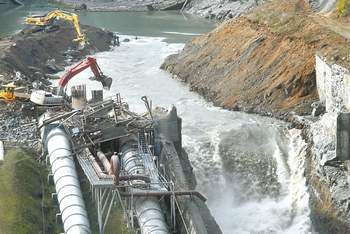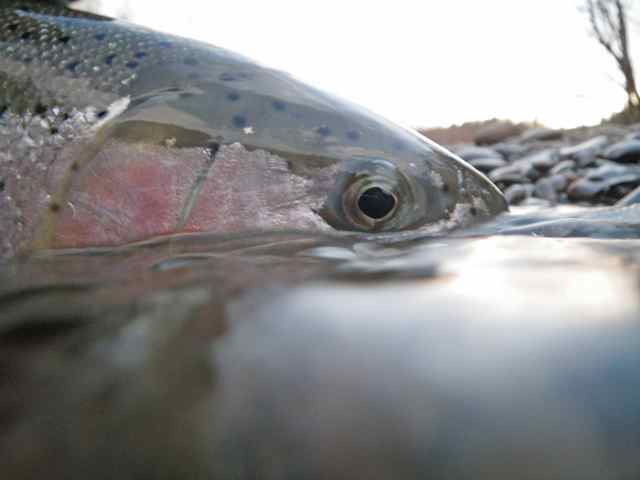Removing the Dams, Restoring a River
 Saturday, February 25, 2012 at 12:00AM
Saturday, February 25, 2012 at 12:00AM  elwha dams,
elwha dams,  elwha river in
elwha river in  Film and Video
Film and Video  Saturday, February 25, 2012 at 12:00AM
Saturday, February 25, 2012 at 12:00AM  elwha dams,
elwha dams,  elwha river in
elwha river in  Film and Video
Film and Video  Friday, February 10, 2012 at 12:05AM
Friday, February 10, 2012 at 12:05AM
Patagonia Fly Fishing Ambassdor Dylan Tomine eloquently sums up what's at stake and why we should let nature take its course.
For Immediate Release: Thursday, February 9, 2012
Citing warnings from agency and independent scientists, four conservation groups filed suit today against several federal agencies and officials of the Lower Elwha Klallam Tribe (in their official capacities) for violating the Endangered Species Act (ESA) and ignoring the best available science and threatening the recovery of killer whales, Chinook salmon, and native steelhead by funding and operating fish hatchery programs in the Elwha River. The groups agree with federal and state scientists and a recent review by the Hatchery Scientific Review Group (HSRG) that restoration of the lower Elwha River and recolonization of the pristine upper Elwha River above Elwha and Glines Canyon dams should prioritize recovery of wild fish. The proposed reliance on large-scale hatchery releases undermines ecosystem recovery and violates the ESA. Wild Fish Conservancy, The Conservation Angler, the Federation of Fly Fishers Steelhead Committee, and the Wild Steelhead Coalition have brought the suit against the Olympic National Park, NOAA Fisheries Service, the U.S. Fish and Wildlife Service, and representatives of the Lower Elwha Klallam Tribe.
The federal government is spending nearly $325 million for the dam removal project, opening nearly ninety miles of pristine riverine habitat in Olympic National Park, much of which is designated a wilderness area. Rather than allowing wild salmonids to naturally colonize this pristine habitat, the agencies and the Tribe are going ahead with a plan that will release approximately four million juvenile hatchery salmonids annually throughout the recovery, including the continued release of non-native steelhead during a five-year fishing moratorium. The hatchery releases will be supported by a new fish hatchery on the Elwha River built with $16.4 million of Stimulus Act funds. State and federal agency scientists pointed out that the current plan gives no measureable goals for wild fish recovery, provides no timetable for ceasing the hatchery production, and that ultimately, wild fish recovery is going to be hampered by the hatchery fish. A review released this week by the independent Hatchery Scientific Review Group (HSRG), which was organized and funded by Congress, has echoed these concerns.
“While the Tribe played an essential role in removing the dams,” said Kurt Beardslee, Executive Director of Wild Fish Conservancy, “their intent to now plant millions of hatchery fish in disregard of the scientific evidence undermines salmon recovery in the Northwest and the goals of the ESA. However you look at it, it’s a horrible precedent if left to stand.”
Will Atlas, chair of the FFF Steelhead Committee, stated “The science does not support planting of hatchery fish into this productive, pristine habitat.”
“This action is necessary,” said Rich Simms, president of the Wild Steelhead Coalition, “so that wild, not hatchery, steelhead will be restored to the Elwha and the Olympic Wilderness."
“Their plan is vague and uncertain about how and when these hatchery interventions will end,” said Pete Soverel, president of The Conservation Angler. “The Elwha deserves far better but will end up compromised like most of our other rivers if this plan is implemented.”
The groups believe that spending $325 million to open a wilderness watershed but then stocking it with hatchery fish is poor public policy and will likely provoke taxpayer skepticism toward salmon recovery and future efforts at dam removal. The groups support the right of the Lower Elwha Klallam Tribe to harvest salmon and steelhead, but argue that intensive hatchery production throughout the recovery will reduce the capacity of wild salmon and steelhead to recolonize the newly available habitat, harming ESA listed Puget Sound steelhead, Chinook salmon, and southern resident killer whales that depend on Chinook salmon for their survival.
The groups are represented by Smith and Lowney, PLLC, of Seattle.
 Friday, October 21, 2011 at 12:00AM
Friday, October 21, 2011 at 12:00AM 
Here is the result of the blasting of the old Elwha dam spillway. The lake level will drop 4 feet in the next week.
(Via: The Penninsula Daily)
 elwha dam removal,
elwha dam removal,  elwha river in
elwha river in  Environment,
Environment,  News
News  Tuesday, September 6, 2011 at 12:00AM
Tuesday, September 6, 2011 at 12:00AM Watch a group of scientists install a large fish weir on the Elwha River and gather data from migrating salmon.
 elwha river,
elwha river,  fish video in
fish video in  Film and Video
Film and Video  Tuesday, August 23, 2011 at 12:00AM
Tuesday, August 23, 2011 at 12:00AM  Wednesday, August 3, 2011 at 12:02AM
Wednesday, August 3, 2011 at 12:02AM 
Crosscut has an in depth story regarding the misguided hatchery planned for the Elwha. This piece is a buffed out version of a recent op-ed written by the same authors in the Seattle Times.
Despite all the public interest, decisions on the Elwha recovery plan have been made largely without public input, driven instead by the millions of dollars set aside for a misguided and counterproductive hatchery. Meanwhile, research and monitoring critical in tracking the progress of the recovery remains woefully under funded. The recovery plan claims that hatchery releases will be phased out as wild fish recover in the watershed, yet to date no benchmarks for wild recovery have been set, giving hatchery managers a blank check to continue harmful hatchery programs in perpetuity.
LINK (Via: Crosscut)
Guide and writer Bob Triggs adds his voice in this letter to the editor in the Seattle Times.